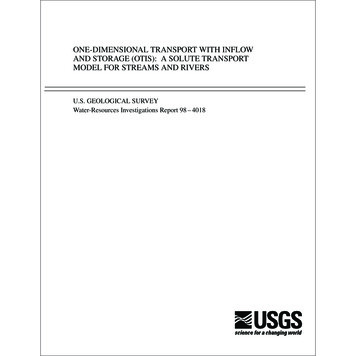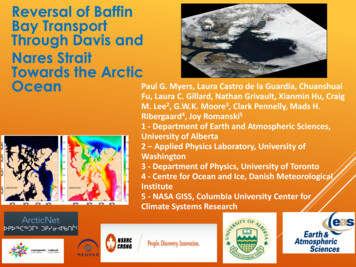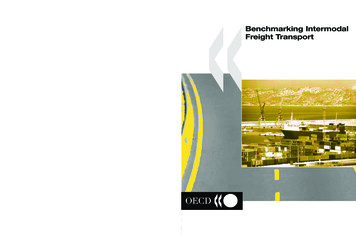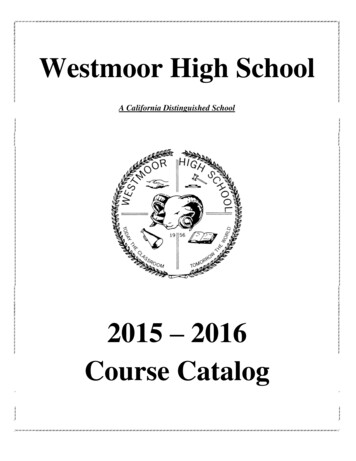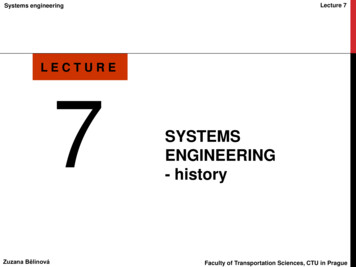
Transcription
Lecture 7Systems engineeringLECTURE7Zuzana BělinováSYSTEMSENGINEERING- historyFaculty of Transportation Sciences, CTU in Prague
Lecture 7Systems engineeringLECTURE 7 – OVERVIEW Systems Theory and Engineering History of systems thinking and theory Founders of Systems Theory History of systems engineering – projects Organizations in systems theory andsystems engineeringZuzana BělinováFaculty of Transportation Sciences, CTU in Prague
Lecture 7Systems engineeringORIGIN OF THE SYSTEMSTHEORY – ANCIENT WORLDOrigin in philosophyAncient GreeceAristotle (384-322 BC)“The whole is more than the sum of its parts” -MetaphysicaZuzana BělinováFaculty of Transportation Sciences, CTU in Prague
Lecture 7Systems engineeringORIGIN OF THE SYSTEMSTHEORY – MEDIEVAL TIMESGottfried Wilhelm von Leibniz (1646-1716) Philosopher, scientist, mathematician Parent of modern logic and analytic philosophyChristian Wolff (1679-1754) Philosopher demonstrative-deductive, mathematical methods Follower of LeibnizZuzana BělinováFaculty of Transportation Sciences, CTU in Prague
Lecture 7Systems engineeringORIGIN OF THE SYSTEMSTHEORY – MEDIEVAL TIMESÉtienne Bonnot de Condillac philosopher, psychologist, logician, economist Friend with Jean-Jacques Rousseau Tract about system (1749 ): „.any system is not anything elsethen a distribution of different parts of any art or science with theknown order, where all of these are mutually maintaining andwhere concluding parts are resolved by initiatory.“Zuzana BělinováFaculty of Transportation Sciences, CTU in Prague
Lecture 7Systems engineeringORIGIN OF THE SYSTEMSTHEORY – MEDIEVAL TIMESJohann Heinrich Lambert (1728-1777) Mathematician, physicist, astronomer, philosopher, distinguishing subjective from objective appearances Systems, system attributes – efficient, purpose, self-sustaining,etc.Zuzana BělinováFaculty of Transportation Sciences, CTU in Prague
Lecture 7Systems engineeringSYSTEM THEORY DURINGINDUSTRIAL REVOLUTIONReductionism instead of holistic attitudeDevelopment of economic rial-revolution/g-6mds4b220k15kdh3jno2ga0?old view TrueZuzana BělinováFaculty of Transportation Sciences, CTU in Prague
Lecture 7Systems engineeringSYSTEMS THEORY BACKGROUND– RECENT HISTORYBeginning of 20th century Over-specialization of particular scientific subjects Lack of mutual correspondence and understanding amongscientists not only of the distant, but even the neighbouringbranches of science Rediscovering basically the same laws and knowledge in distinctbranches of science Systems Sciences formation using pieces of knowledge from thefields of biology, physics and social scienceZuzana BělinováFaculty of Transportation Sciences, CTU in Prague
Lecture 7Systems engineeringSYSTEMS THEORY BACKGROUND– RECENT HISTORY1930s Ludwig von Bertalanffy publishes Organismic system theory1955 William Ross Ashby publishes Introduction to Cybernetics1968 Ludwig von Bertalanffy publishes General System theory:Foundations, Development, Applications1960s Charles West Churchman incorporating ethical values intooperating systems1960s Hermann Haken – self-organization of non-equilibrium systems,development of synergetics1970-1980s Second-order cybernetics developed by Heinz von Foerster,Gregory Bateson, Humberto Maturana and othersZuzana BělinováFaculty of Transportation Sciences, CTU in Prague
Lecture 7Systems engineeringSYSTEMS THEORY BACKGROUND– RECENT HISTORY1970s Catastrophe theory (René Thom, Erik Christopher Zeeman)Dynamical systems in mathematics.1970s Russell Lincoln Ackoff – how systems thinking relates to humanbehaviour, „purposeful systems“1977 Ilya Prigogine received the Nobel Prize for his works on selforganization, conciliating important systems theory concepts with systemthermodynamics.1980s Robert Rosen developing Complex Systems Biology1980s Chaos theory David Ruelle, Edward Lorenz, Mitchell Feigenbaum,Steve Smale, James Alan Yorke1980s Peter Checkland – Soft systems methodologies1986 Context theory, Anthony Wilden1990 Complex adaptive systems (CAS), John Henry Holland (professor ofpsychology, electrical engineering and computer science), Murray GellMann (physicist. Nobel prize 1969 for theory of elementary particles),William Brian Arthur (economist)Zuzana BělinováFaculty of Transportation Sciences, CTU in Prague
Lecture 7Systems engineeringSystems theory foundersZuzana BělinováFaculty of Transportation Sciences, CTU in Prague
Lecture 7Systems engineeringSYSTEMS THEORY FOUNDERSLudwig von Bertalanffy (1901-1972) Austrian-born biologist Main founder of the general systems theory Already in the 1930's Bertalanffy formulated the organismic systemtheory (assigns to the biological systems a self-organizationaldynamics) For this theory developed the kinetic theory of open systems Later it became the kernel of the GST General systems theory methodology that is valid for all sciences 1940's he conducted his theory of open systems from athermodynamical point worked on metabolism, growth, biophysics, and cancer cytologyZuzana BělinováFaculty of Transportation Sciences, CTU in Prague
Lecture 7Systems engineeringSYSTEMS THEORY FOUNDERSLudwig von Bertalanffy (1901-1972) – continuation from the 1950's onwards he shifted his research from the biologicalsciences to the methodology of science, the General System Theory(GST) - new paradigm which should control the model constructionin all the sciences Describes its models in a qualitative and non-formalized language Deduce universal principles which are valid for systems in general System as set of interrelated components, a complex entity in spacetime which shows structural similarities System constitutes itself in such a way that the systemic particlesmaintain their structure by an assemblage process and tend torestore themselves after disturbances-analogous to the features of aliving organismZuzana BělinováFaculty of Transportation Sciences, CTU in Prague
Lecture 7Systems engineeringSYSTEMS THEORY FOUNDERSLudwig von Bertalanffy (1901-1972) – continuation Later his system theoretical approach focused on the modern worldof technology emphasized in his later works the importance of the symbolic worldsof culture themes encompassed theoretical biology, experimental physiology,theoretical psychology, cancer research, and philosophy and historyof scienceZuzana BělinováFaculty of Transportation Sciences, CTU in Prague
Lecture 7Systems engineeringSYSTEMS THEORY FOUNDERSIlya Prigogine (1917-2003) awarded the Nobel Prize for Chemistry in 1977 for his contributionsto non-equilibrium thermodynamics, particularly the theoryof dissipative structures dissipative structures - systems existing and established only on thebasis of a continuous dissipation of matter-energy provide a better understanding of the role of time in the PhysicalSciences and in Biology understanding of irreversible processes, particularly in systems farfrom equilibriumZuzana BělinováFaculty of Transportation Sciences, CTU in Prague
Lecture 7Systems engineeringSYSTEM THEORY FOUNDERSAnatol Rapoport (1901-2007) mathematical psychologist studies in conflict & cooperation, and peace research application of mathematical methods, first to biologyand later to the social sciencesKenneth Boulding (1910-1993) emphasized that human economic and other behaviour isembedded in a larger interconnected system emphasized research and development of scientificunderstanding of the ecodynamics of the general system tounderstand human behaviour and economicsZuzana BělinováFaculty of Transportation Sciences, CTU in Prague
Lecture 7Systems engineeringSYSTEM THEORY FOUNDERSRalph Waldo Gerard (1900-1974) neurophysiologist and behavioral scientist work on the nervous system, nerve metabolism,psychopharmacology, and biological basis of schizophrenia referred to scientists as the brain of the social organism, depictingscience as a kind of guidance system Obtained many honors, e.g. medal from Charles University inPrague, the Order of the White Lion (4th class) of Czechoslovakia in1946Zuzana BělinováFaculty of Transportation Sciences, CTU in Prague
Lecture 7Systems engineeringSystems engineeringZuzana BělinováFaculty of Transportation Sciences, CTU in Prague
Lecture 7Systems engineeringSystems engineering definitionsZuzana BělinováFaculty of Transportation Sciences, CTU in Prague
Lecture 7Systems engineeringSYSTEMS ENGINEERINGACCORDING HALL [1962]Operates in the space between research andbusiness, and assumes the attitudes of both.considers the needs of its customers and determineshow these can be best metformulates the operational, performance and economicobjectives, and the broad technical plan to befollowed.Zuzana BělinováFaculty of Transportation Sciences, CTU in Prague
Lecture 7Systems engineeringSYSTEMS ENGINEERINGPROCESS ACCORDING HALL[1962]Functions in five phases: system studies or program planning; exploratory planning, which includes problem definition,selecting objectives, systems synthesis, systems analysis,selecting the best system, and communicating the results; development planning, which repeats phase 2 in more detail; studies during development, which includes the developmentof parts of the system and the integration and testing of theseparts; current engineering, which is what takes place while thesystem is operational and being refined.Zuzana BělinováFaculty of Transportation Sciences, CTU in Prague
Systems engineeringSYSTEM ENGINEERINGACCORDING INCOSE (InternationalLecture 7Council on Systems Engineering)interdisciplinary approach and means to enable the realization of successfulsystems.focuses on defining customer needs and required functionality early in thedevelopment cycle, documenting requirements, then proceeding with designsynthesis and system validation while considering the complete problem: Operations Cost & Schedule Performance Training & Support Test Disposal Manufacturingintegrates all the disciplines and specialty groups into a team effort forming astructured development process that proceeds from concept to production tooperation.considers both the business and the technical needs of all customers with thegoal of providing a quality product that meets the user needs.Zuzana BělinováFaculty of Transportation Sciences, CTU in Prague
Lecture 7Systems engineeringHistory of Systems engineering - projectsZuzana BělinováFaculty of Transportation Sciences, CTU in Prague
Lecture 7Systems engineeringHISTORY OF SYSTEMSENGINEERINGTraces of Systems engineering may be found in ancient eraProjects in ancient Egypt, Mezopotamia, Greece, Rome water distribution systems, irrigation systems pyramids roman road systemZuzana BělinováFaculty of Transportation Sciences, CTU in Prague
Lecture 7Systems engineeringHISTORY OF SYSTEMSENGINEERINGPyramid buildingToday‘s idea:Tens of thousand craftsman (not slaves)ForeignersWorked for salariesMoving stone blocks with weight of up to 70 tons, extremeaccuracy in proportionsMethod still unknownTheory pyramids served as astronomic observatoryNumber of wild theories, you can find the pi number, Eulersnumber, number of days, Earth radius, Earth-Sol distance, Zuzana BělinováFaculty of Transportation Sciences, CTU in Prague
Lecture 7Systems engineeringHISTORY OF SYSTEMSENGINEERINGRoman AquaductsStatus in the late 3rd century:11 main aquaducts leading to RomeTotal lenght around 800 km, around 50 km od aquaducts (bridges)Total supplay about 1 million cubic metres of water per day!Zuzana BělinováFaculty of Transportation Sciences, CTU in Prague
Lecture 7Systems engineeringHISTORY OF SYSTEMSENGINEERINGRoman road systemBuild from 4th century BCAround 80 000 km of hard surfaced roadsIrrigation systems in Mesopotamia Using flooding System of dikes, canals, dams, Used for hundreds of yearsZuzana BělinováFaculty of Transportation Sciences, CTU in Prague
Lecture 7Systems engineeringRECENT HISTORY OF SYSTEMSENGINEERING - PROJECTSThe concepts of systems engineering can be traced back withinBell Labs to early 1900sThe term systems engineering dates back to Bell TelephoneLaboratories in the early 1940s [e.g. Hall, 1962].British multi-disciplined team formed (1937) to analyze air defensesystemThe Department of Defense entered the world of systemsengineering in the late 1940s with the initial development ofmissiles and missile-defense systems [Goode and Machol, 1957].Systems engineering projects during World War IINumber of projects followedZuzana BělinováFaculty of Transportation Sciences, CTU in Prague
Lecture 7Systems engineeringHISTORY OF SYSTEMSENGINEERING - PROJECTSBell Labs supported Nikedevelopment (1945-1953)– Nike - line-of-sight anti-aircraftmissile systemhttp://en.wikipedia.org/wiki/Project NikeSAGE Air Defense system (SAGE - Semi Automatic GroundEnvironment (SAGE) air-defense system) defined and managedby MIT (1951 – 1980)ATLAS Intercontinental Ballistic Missile Program managed bysystems contractor Ramo-Wooldridge Corporation (1954 – 1964)Zuzana BělinováFaculty of Transportation Sciences, CTU in Prague
Lecture 7Systems engineeringRECENT HISTORY OF SYSTEMSENGINEERING - PROJECTSthe Apollo project (1961-1972)Complex engineering systemsTechnical and social processesIncorporating various elements:http://www.nasa.gov/launch vehicles, various upper stage modules toaccomplish lunar orbit rendezvous, descent and returnfrom the lunar surface, earth return, reentry, andrecovery, mission and support crews, missile assemblyand checkout equipment, crew training and manysupport organizations and their facilities, such asdownrange tracking and communications relay stations,mission controlTotal costs as reported in 1973 app. 25 billions USDZuzana BělinováFaculty of Transportation Sciences, CTU in Prague
Lecture 7Systems engineeringRECENT HISTORY OF SYSTEMSENGINEERING - FORMALIZINGThe success of those millitary systems development programsproved the value of systems engineeringThe United States government formalized systems engineeringand documented it for use it in weapon systems developmentThe most notable document U.S. Department of Defense’s MIL-STD-499 (released in 1969)Since 1970s boom of systems engineering applicationsZuzana BělinováFaculty of Transportation Sciences, CTU in Prague
Lecture 7Systems engineeringRECENT HISTORY OF SYSTEMSENGINEERING - FORMALIZINGOther systems engineering standards and recommendationsfollowed: European Cooperation for space standardization, ECSS-E10A (April 1996) system Engineering Electronics Industry Association, EIA-632 (December 1998),Processes for Engineering a system IEEE std 1220-1998, standard for Application andManagement of the systems engineering Process Information Technology Association of America EIA-731-1,systems engineering Capability Model (August 2002)Zuzana BělinováFaculty of Transportation Sciences, CTU in Prague
Lecture 7Systems engineeringRECENT HISTORY OF SYSTEMSENGINEERING – THEORETICAL ISSUESFirst attempt to teach systems engineering as we knowit today came in 1950 at MIT by Mr. Gilman, Director ofSystems Engineering at Bell (according Hall [1962] ).The RAND Corporation (founded in 1946 by the UnitedStates Air Force) created systems analysis, importantpart of systems engineering.Allocation of the systems functions to the physicalelements of the system addressed in the late 1940sand early 1950s [Fitts, 1951].Zuzana BělinováFaculty of Transportation Sciences, CTU in Prague
Lecture 7Systems engineeringSYSTEMS ENGINEERING EDUCATIONToday there are many speciliazed study programs,courses, training for Systems Engineering, both atuniversities and private companies, presentingdifferent attitudes to Systems Engineering.E.g. Information systems enginering Process systems engineering Industrial systems engineering Space systems engineering Computer systems engineering Etc.Zuzana BělinováFaculty of Transportation Sciences, CTU in Prague
Lecture 7Systems engineeringInternational organizations in the systemstheory fieldZuzana BělinováFaculty of Transportation Sciences, CTU in Prague
Lecture 7Systems engineeringSYSTEMS THEORY BACKGROUND– SUPPORTING ORGANIZATIONSIn 1954 Society for the Advancement of General SystemsTheory founded (in 1956 renamed to Society for GeneralSystems Research) by the founders of systems theory biologist Ludwig von Bertalanffy the economist Kenneth Boulding the neuroscientist Ralph Gerard mathematician Anatol RapoportIn 1988 it was renamed to "International Society for theSystems Sciences" (ISSS) in 1988 to "reflect itsbroadening scope“Zuzana BělinováFaculty of Transportation Sciences, CTU in Prague
Lecture 7Systems engineeringINTERNATIONAL SOCIETYFOR THE SYSTEMS SCIENCESAmong the first and oldest organizations devoted tointerdisciplinary inquiry into the nature of complex systemsMost broadly inclusiveThe initial purpose of the society was "to encourage thedevelopment of theoretical systems which are applicable tomore than one of the traditional departments of knowledge"Zuzana BělinováFaculty of Transportation Sciences, CTU in Prague
Lecture 7Systems engineeringINTERNATIONAL SOCIETY FORTHE SYSTEMS SCIENCES - TODAYPrincipal aims: to investigate the isomorphy of concepts, laws, and models invarious fields, and to help in useful transfers from one field toanother; to encourage the development of adequate theoretical modelsin areas which lack them; to eliminate the duplication of theoretical efforts in differentfields; and to promote the unity of science through improving thecommunication among specialists.ISSS has expanded its scope beyond purely theoretical andtechnical considerations to include the practical application ofsystems methodologies to problem solving.Zuzana BělinováFaculty of Transportation Sciences, CTU in Prague
Lecture 7Systems engineeringINTERNATIONAL SOCIETY FORTHE SYSTEMS SCIENCES - TODAYProvides forum where scholars and practitioners fromacross the disciplinary spectrum, representing academic,business, government, and non-profit communities, cancome together to share ideas and learn from one another.Long history of annual meetingsZuzana BělinováFaculty of Transportation Sciences, CTU in Prague
Lecture 7Systems engineeringTOPICS OF SEVERAL LASTCONFERENCES2019 Topic: Nature's Enduring Patterns: A Path to Systems Literacy2018 Topic: Innovation and Optimization in Nature and Design2017 Topic: From Science to Systemic Solutions – Systems Thinkingfor Everyone2016: Topic: Leadership for Sustainability of Socio-EcologicalSystems2015: Topic: Governing the Anthropocene: the greatest challenge forsystems thinking in practice?2013: Topic: Curating the Conditions for a Thrivable Planet: SystemicLeverage Points for Emerging a Global Eco-Civilization2012: Topic: Service Systems, Natural Systems2011: Topic: All together now – working across disciplines: People,principles and practiceZuzana BělinováFaculty of Transportation Sciences, CTU in Prague
Lecture 7Systems engineeringISSS TODAY - SPECIALINTEGRATION GROUPSSIGs: Agent-based Social SimulationBalancing Individualism and CollectivismCritical Systems Theory & PracticeDesigning Educational SystemsEvolutionary DevelopmentHealth and Systems ThinkingHierarchyHuman Systems InquiryInformation Systems Design & Information TechnologyISSS RoundtableLiving Systems ScienceOrganisational Transformation & Social ChangeResearch Towards General Theories of SystemsSocio-Ecological SystemsZuzana BělinováFaculty of Transportation Sciences, CTU in Prague
Lecture 7Systems engineeringISSS TODAY - SPECIALINTEGRATION GROUPSSIGs: Spirituality and SystemsStudents SIGSystemic Approaches to Conflict and CrisesSystemic Approaches to Persistent Poverty and DisadvantageSystems Applications in Business & IndustrySystems Biology and EvolutionSystems and MentalSystems Modeling & SimulationSystems PathologyRelational ScienceService Systems ScienceSystems EngineeringFoundations of Information SystemsMonetary SystemsZuzana BělinováFaculty of Transportation Sciences, CTU in Prague
Lecture 7Systems engineeringORGANIZATIONS IN SYSTEMSENGINEERINGInternational Council on Systems Engineering (INCOSE)Founded in 1990 as the National Concil on Systems Engineering(NCOSE), renamed to International in 1995 not-for-profit membership organization founded to developand disseminate the interdisciplinary principles and practicesthat enable the realization of successful systems Mission - Share, promote and advance the best of systemsengineering from across the globe for the benefit of humanityand the planet. Vision - The world's authority on Systems Engineering.Zuzana BělinováFaculty of Transportation Sciences, CTU in Prague
Lecture 7Systems engineeringORGANIZATIONS IN SYSTEMSENGINEERINGINCOSE Goals To provide a focal point for dissemination of systemsengineering knowledge. To promote international collaboration in systems engineeringpractice, education, and research. To assure the establishment of competitive, scaleableprofessional standards in the practice of systems engineering. To improve the professional status of all persons engaged inthe practice of systems engineering. To encourage governmental and industrial support forresearch and educational programs that will improve thesystems engineering process and its practiceZuzana BělinováFaculty of Transportation Sciences, CTU in Prague
Lecture 7Systems engineeringThank you for your attentionZuzana BělinováFaculty of Transportation Sciences, CTU in Prague
Lecture 7Systems engineeringREFERENCESDennis Buede, The Engineering Design of Systems: Models and Methods, John J. Wiley &Sons.2000Tom Weisgerber. History of Systems Engineering. iates.com/history-of-systems-engineeringDavid Beale and Joseph Bonometti. Chapter 2: Systems Engineering (SE) – The Systems http://www.incose.org/Hall, Arthur D., A Methodology for Systems Engineering, Van Nostrand, New York, 1962.Systems theory. In Wikipedia. Retrieved November 20, 2011, fromhttp://en.wikipedia.org/wiki/Systems theorySystems engineering. In Wikipedia. Retrieved November 20, 2011,http://en.wikipedia.org/wiki/Systems org/lumrapo.htmZuzana BělinováFaculty of Transportation Sciences, CTU in Prague
Systems engineering Zuzana Bělinová Faculty of Transportation Sciences, CTU in Prague Lecture 7 RECENT HISTORY OF SYSTEMS ENGINEERING - PROJECTS The concepts of systems engineering can be traced back within Bell Labs to early 1900s The term systems engineering dates back to Bell Telephone Laboratories in the early 1940s [e.g. Hall, 1962].
